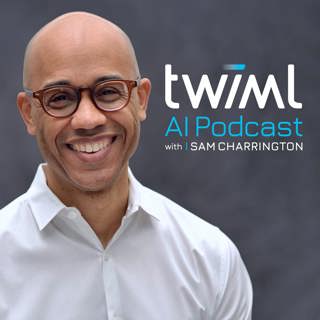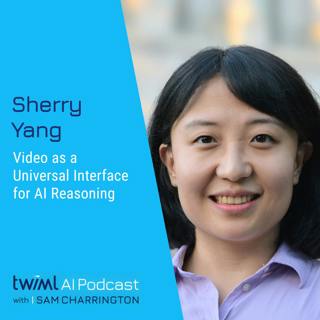
Video as a Universal Interface for AI Reasoning with Sherry Yang - #676
Today we’re joined by Sherry Yang, senior research scientist at Google DeepMind and a PhD student at UC Berkeley. In this interview, we discuss her new paper, "Video as the New Language for Real-World Decision Making,” which explores how generative video models can play a role similar to language models as a way to solve tasks in the real world. Sherry draws the analogy between natural language as a unified representation of information and text prediction as a common task interface and demonstrates how video as a medium and generative video as a task exhibit similar properties. This formulation enables video generation models to play a variety of real-world roles as planners, agents, compute engines, and environment simulators. Finally, we explore UniSim, an interactive demo of Sherry's work and a preview of her vision for interacting with AI-generated environments. The complete show notes for this episode can be found at twimlai.com/go/676.
18 Mar 202449min
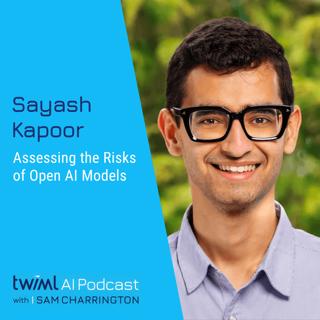
Assessing the Risks of Open AI Models with Sayash Kapoor - #675
Today we’re joined by Sayash Kapoor, a Ph.D. student in the Department of Computer Science at Princeton University. Sayash walks us through his paper: "On the Societal Impact of Open Foundation Models.” We dig into the controversy around AI safety, the risks and benefits of releasing open model weights, and how we can establish common ground for assessing the threats posed by AI. We discuss the application of the framework presented in the paper to specific risks, such as the biosecurity risk of open LLMs, as well as the growing problem of "Non Consensual Intimate Imagery" using open diffusion models. The complete show notes for this episode can be found at twimlai.com/go/675.
11 Mar 202440min
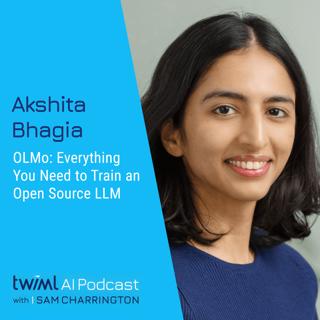
OLMo: Everything You Need to Train an Open Source LLM with Akshita Bhagia - #674
Today we’re joined by Akshita Bhagia, a senior research engineer at the Allen Institute for AI. Akshita joins us to discuss OLMo, a new open source language model with 7 billion and 1 billion variants, but with a key difference compared to similar models offered by Meta, Mistral, and others. Namely, the fact that AI2 has also published the dataset and key tools used to train the model. In our chat with Akshita, we dig into the OLMo models and the various projects falling under the OLMo umbrella, including Dolma, an open three-trillion-token corpus for language model pretraining, and Paloma, a benchmark and tooling for evaluating language model performance across a variety of domains. The complete show notes for this episode can be found at twimlai.com/go/674.
4 Mar 202432min
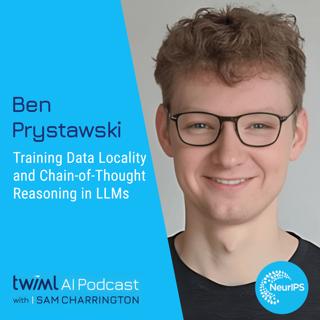
Training Data Locality and Chain-of-Thought Reasoning in LLMs with Ben Prystawski - #673
Today we’re joined by Ben Prystawski, a PhD student in the Department of Psychology at Stanford University working at the intersection of cognitive science and machine learning. Our conversation centers on Ben’s recent paper, “Why think step by step? Reasoning emerges from the locality of experience,” which he recently presented at NeurIPS 2023. In this conversation, we start out exploring basic questions about LLM reasoning, including whether it exists, how we can define it, and how techniques like chain-of-thought reasoning appear to strengthen it. We then dig into the details of Ben’s paper, which aims to understand why thinking step-by-step is effective and demonstrates that local structure is the key property of LLM training data that enables it. The complete show notes for this episode can be found at twimlai.com/go/673.
26 Feb 202425min
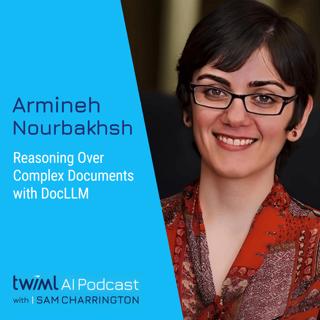
Reasoning Over Complex Documents with DocLLM with Armineh Nourbakhsh - #672
Today we're joined by Armineh Nourbakhsh of JP Morgan AI Research to discuss the development and capabilities of DocLLM, a layout-aware large language model for multimodal document understanding. Armineh provides a historical overview of the challenges of document AI and an introduction to the DocLLM model. Armineh explains how this model, distinct from both traditional LLMs and document AI models, incorporates both textual semantics and spatial layout in processing enterprise documents like reports and complex contracts. We dig into her team’s approach to training DocLLM, their choice of a generative model as opposed to an encoder-based approach, the datasets they used to build the model, their approach to incorporating layout information, and the various ways they evaluated the model’s performance. The complete show notes for this episode can be found at twimlai.com/go/672.
19 Feb 202445min
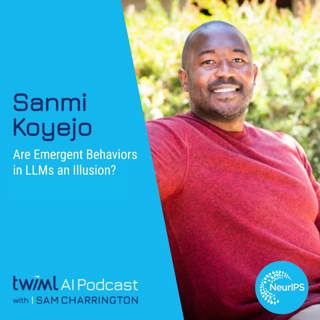
Are Emergent Behaviors in LLMs an Illusion? with Sanmi Koyejo - #671
Today we’re joined by Sanmi Koyejo, assistant professor at Stanford University, to continue our NeurIPS 2024 series. In our conversation, Sanmi discusses his two recent award-winning papers. First, we dive into his paper, “Are Emergent Abilities of Large Language Models a Mirage?”. We discuss the different ways LLMs are evaluated and the excitement surrounding their“emergent abilities” such as the ability to perform arithmetic Sanmi describes how evaluating model performance using nonlinear metrics can lead to the illusion that the model is rapidly gaining new capabilities, whereas linear metrics show smooth improvement as expected, casting doubt on the significance of emergence. We continue on to his next paper, “DecodingTrust: A Comprehensive Assessment of Trustworthiness in GPT Models,” discussing the methodology it describes for evaluating concerns such as the toxicity, privacy, fairness, and robustness of LLMs. The complete show notes for this episode can be found at twimlai.com/go/671.
12 Feb 20241h 5min
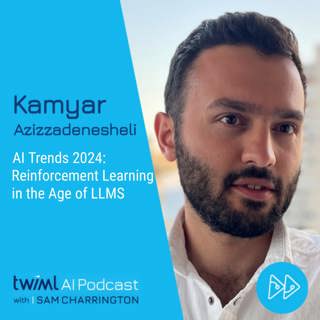
AI Trends 2024: Reinforcement Learning in the Age of LLMs with Kamyar Azizzadenesheli - #670
Today we’re joined by Kamyar Azizzadenesheli, a staff researcher at Nvidia, to continue our AI Trends 2024 series. In our conversation, Kamyar updates us on the latest developments in reinforcement learning (RL), and how the RL community is taking advantage of the abstract reasoning abilities of large language models (LLMs). Kamyar shares his insights on how LLMs are pushing RL performance forward in a variety of applications, such as ALOHA, a robot that can learn to fold clothes, and Voyager, an RL agent that uses GPT-4 to outperform prior systems at playing Minecraft. We also explore the progress being made in assessing and addressing the risks of RL-based decision-making in domains such as finance, healthcare, and agriculture. Finally, we discuss the future of deep reinforcement learning, Kamyar’s top predictions for the field, and how greater compute capabilities will be critical in achieving general intelligence. The complete show notes for this episode can be found at twimlai.com/go/670.
5 Feb 20241h 10min
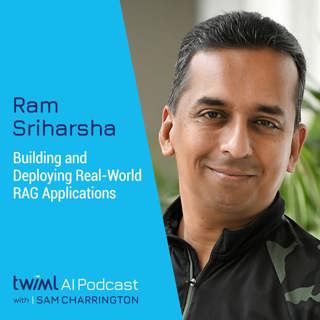
Building and Deploying Real-World RAG Applications with Ram Sriharsha - #669
Today we’re joined by Ram Sriharsha, VP of engineering at Pinecone. In our conversation, we dive into the topic of vector databases and retrieval augmented generation (RAG). We explore the trade-offs between relying solely on LLMs for retrieval tasks versus combining retrieval in vector databases and LLMs, the advantages and complexities of RAG with vector databases, the key considerations for building and deploying real-world RAG-based applications, and an in-depth look at Pinecone's new serverless offering. Currently in public preview, Pinecone Serverless is a vector database that enables on-demand data loading, flexible scaling, and cost-effective query processing. Ram discusses how the serverless paradigm impacts the vector database’s core architecture, key features, and other considerations. Lastly, Ram shares his perspective on the future of vector databases in helping enterprises deliver RAG systems. The complete show notes for this episode can be found at twimlai.com/go/669.
29 Jan 202435min
